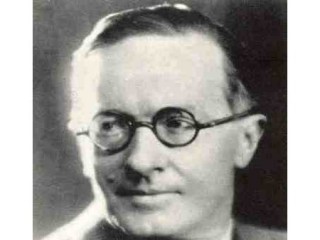
Jean Giraudoux (En.) biography
Date of birth : 1882-10-29
Date of death : 1944-01-31
Birthplace : Bellac, Limousin
Nationality : French
Category : Famous Figures
Last modified : 2011-07-22
Credited as : Dramatist, diplomat, playwright
Jean GiraudouxBella was born on Oct. 29, 1882, in the little town of Bellac in the Limousin, the second son of a provincial employee of the highway department and a gentle, reserved mother whose letters show a natural gift for writing. Although the family moved to Pellevoisin when Jean was only 7, Bellac remained for him the symbol of a certain ideal way of life. Several of his most appealing characters are also natives of Bellac, for example, l'Apollon de Bellac and Suzanne.
In 1893 Giraudoux received a scholarship at the Iycee of Chaeauroux, where he was an excellent pupil for 7 years. His partly autobiographical novel Simon le pathetique (1926) and memories of his classmates give a picture of a polite, sensitive, aloof adolescent with a certain elegance in dress and language and a passion for excelling in both studies and sports. He received in this provincial school a solid humanistic education from excellent, idealistic teachers. His last 2 years of secondary school were spent in Paris, where he stood first in his class.
In 1903, after a year of military service, Giraudoux was admitted to the Ecole Normale Superieure in Paris, where he maintained his brilliant record. His study of German literature, his major field of interest, and his subsequent contact with German civilization during a year on scholarship in Germany had a lasting effect on his intellectual and artistic life. While hesitating before committing himself to the career of a scholar, he spent a happy year as an assistant in French at Harvard University, a year which proved to be his last formal contact with the academic world.
Upon his return to France in 1908, Giraudoux took a position as assistant literary editor on the paper Le Matin. For several years, free at last from the discipline of school and examinations, he led a carefree life and kept postponing a decision on a career. Through his position he began to meet writers and eventually tried his own hand at writing short stories. Some of these were completely traditional and undistinguished, but others, published in 1909 in the volume entitled Les Provinciales, already showed signs of his original style and his peculiar vision of the world.
In these stories, based on childhood memories, Giraudoux gives a universal dimension to commonplace events by setting them in a cosmic context, a formula that was to become his most characteristic manner. Another volume, of three novellas, L'Ecole des indifferents (1911), reflects his own existing mood of uncommitted detachment.
In 1910 Giraudoux took and passed the examination that would allow him to train for the consular service. Before the war he was never promoted beyond the rank of diplomatic courier and vice-consul. At the outbreak of hostilities, he was drafted and subsequently served on the French front and at the Dardanelles. Twice wounded and finally discharged, he was sent in 1916 as a military instructor to Portugal and later to Harvard. His war books, Lectures pour une ombre (1917) and Adorable Clio (1920), are meditations on the war rather than descriptions of it. In Amica America (1919) Giraudoux paints the New World with a good deal of fantasy but with genuine sympathy.
In 1918 Giraudoux married Suzanne Boland, who the following year bore his only child, Jean Pierre. Another examination entitled him to the post of embassy secretary, but he accepted instead the directorship of a government service which was eventually to become the Department of Cultural Relations. This position may have inspired his first nonautobiographical work, the novel Suzanne et le Pacifique (1921), whose heroine, a newstyle Robinson Crusoe, rejects the temptation to abandon her native culture as she grows to understand it better alone on her desert isle.
Ever since his student days Giraudoux had been concerned with the Franco-German question. This is the problem he takes up in his novel Siegfried et le Limousin (1922). Quite characteristically he treats it not in political or economic (that is, realistic) terms but in a poetic, almost mystical consideration of national character and cultural inheritance.
While serving as chief of the Information and Press Services of the Ministry of Foreign Affairs (1926-1934), Giraudoux was appointed to the commission to settle Turkey's war claims. He assumed the post of inspector of diplomatic and consular positions in 1936. In this office he wrote Pleins pouvoirs (1939), a remarkable double-headed work that outlines, on the one hand, the political, economic, and moral reforms he proposed to Edouard Daladier, and defines, on the other, his understanding of the cultural heritage and destiny of France. At this critical moment of its history, Giraudoux saw France's salvation in a preservation of the humanistic ideal. Profoundly affected by the events of 1939-1940, he retired from public life and died on Jan. 31, 1944.
















